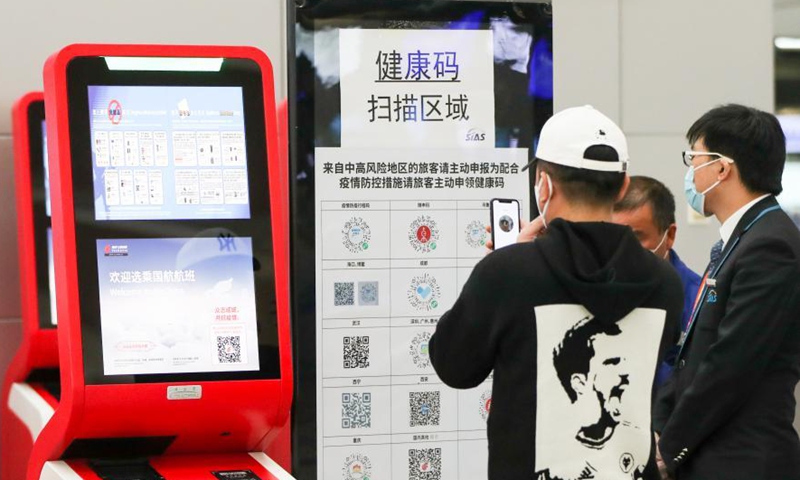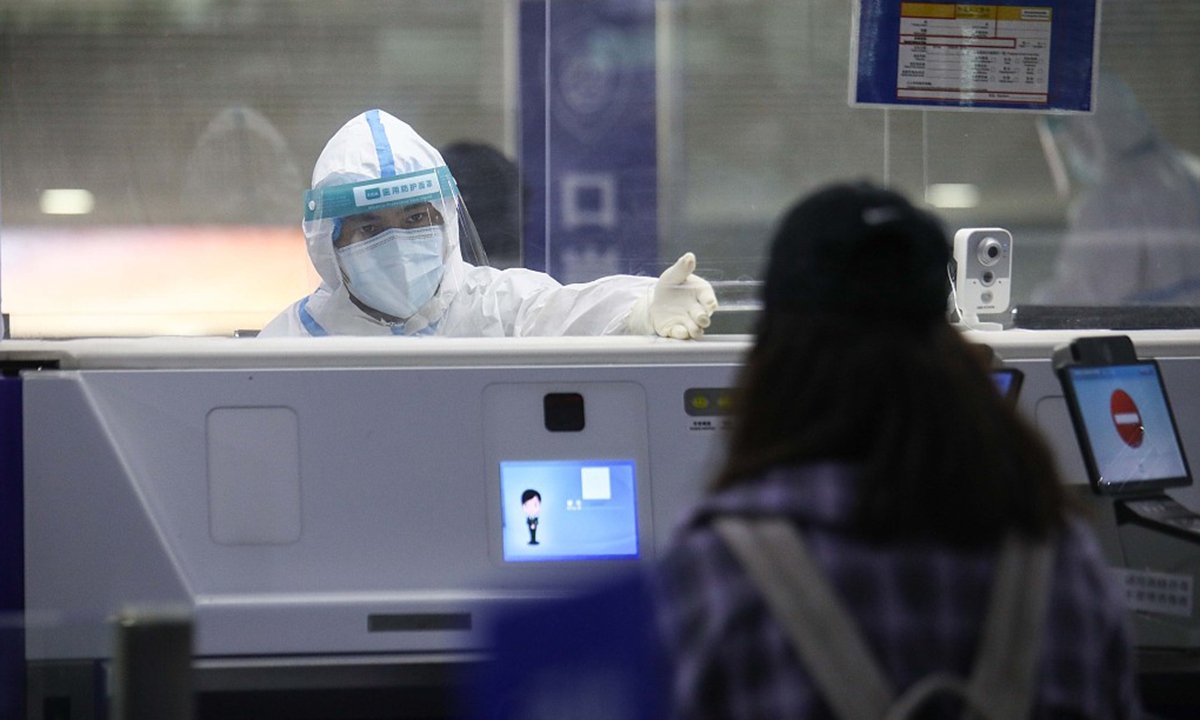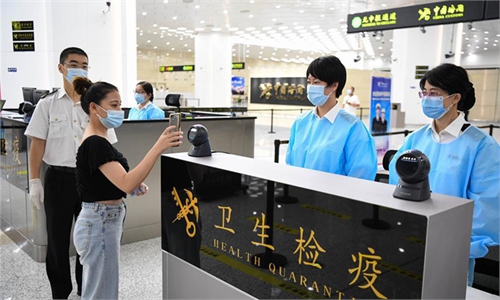Global health codes, fast track challenged
Chinese embassies in at least 12 countries require QR codes for travelers

Passengers perform self-service personal health confirmation at Terminal 2 building of the Shanghai Pudong International Airport in east China's Shanghai, Nov. 24, 2020. Photo:Xinhua
With setting a "fast track" for personnel exchanges and requiring pre-departure health QR codes for overseas passengers, China is gradually pushing a global mechanism of mutual health status recognition to drag the world to the path of recovery amid the pandemic. However, as for China, the only entity that has maintained economic growth amid the pandemic, it is not easy to lead the formation of a global health recognition mechanism in which people from different countries can use the universal health code and fast track for recovery.
The Japanese embassy in China announced on Friday that China will officially open a fast track with Japan on November 30, when Japan will start accepting visa applications for business passage.
The "fast track" is a "work-resumption expressway" for the personnel exchanges between foreign-invested enterprises amid the virus outbreak. According to the mechanism, relevant people do not need to be quarantined for 14 days after arrival; they only need to travel with a China-recognized health code.
Also on Friday, the Chinese Embassy in Singapore announced that starting December 1, all China-bound foreign travelers from Singapore need to hold a QR health code for boarding, which means that the nucleic acid and IgM anti-body test results will no longer valid.
At least over a dozen embassies recently announced the new policy (basically the premise of "fast track" in the future), including South Korea, Japan, France and the US. For foreign passengers, they just need to do as Chinese people - fill in basic information and upload pictures of testing certificates.
Among countries in which Chinese embassies have announced the new pre-boarding policy, South Korea, Singapore and Japan have come close to China in pushing the global mechanism.
However, the "fast track" has been clouded by the resurgence of the coronavirus. Japan and South Korea reported 1,861 and 569 COVID-19 cases on Thursday, respectively, and both countries are seen as experiencing a third wave.
Japanese Prime Minister Yoshihide Suga said Wednesday that the next three weeks are vital to containing the epidemic, and people should cooperate with the government, wear masks, wash their hands frequently, and avoid crowded places. South Korea's disease control and prevention authority said on Thursday that it expects the spread of COVID-19 in the country to continue this week, and will discuss further upgrades to its epidemic response level if necessary, Xinhua News Agency reported.
Liu Jiangyong, vice dean of the Institute of Modern International Relations at Tsinghua University, told the Global Times that the new surge in Japan and South Korea is likely to mean stricter inspections for the fast track service, but it won't be closed or canceled.
The fast track is likely to shrink its passenger volume, and Customs may impose stricter quarantine measures, said Liu, noting that strict epidemic prevention measures form the premise of resuming work and production.

Photo:VCG
Yang Zhanqiu, deputy director of the pathogen biology department at Wuhan University, told the Global Times that fast-track programs and international flights feature sound and strict epidemic prevention measures, such as nucleic acid tests and quarantine periods. With the proper measures in place, there's no need to suspend personnel exchanges.
However, it is questionable whether that kind of mutual trust mode in East Asia would occur when some Western countries discuss global health mechanism with China.
People living in China are familiar with this kind of QR code health system, and consider it effective and convenient, but media like BBC have questioned China's efforts to restart the world exchange with cliches like "infringement of privacy," without mentioning that the UK in September finally released their national health tracing app NHS Covid-19.
Wang Hongwei, a professor at Renmin University of China's School of Public Administration and Policy, told the Global Times on Friday that for the health code system, technical issues are inevitable. But countries can work together to solve them.
Wang said there is a need for the world to jointly set up a circuit breaker mechanism on "fast track." Countries can temporarily shut down the fast track once the number of a country's daily COVID-19 cases reaches the upper limit they can afford or trust, which is better than having no such mechanism, said Wang.
As the transmission routes diversified in China with frozen food and containers being tested positive, Wang said that the exchange involving certain kinds of occupations such as loading workers and international cargo personnel should be paid special attention, adding that strengthened border checks or nucleic acid tests may be required for people in such sectors.


